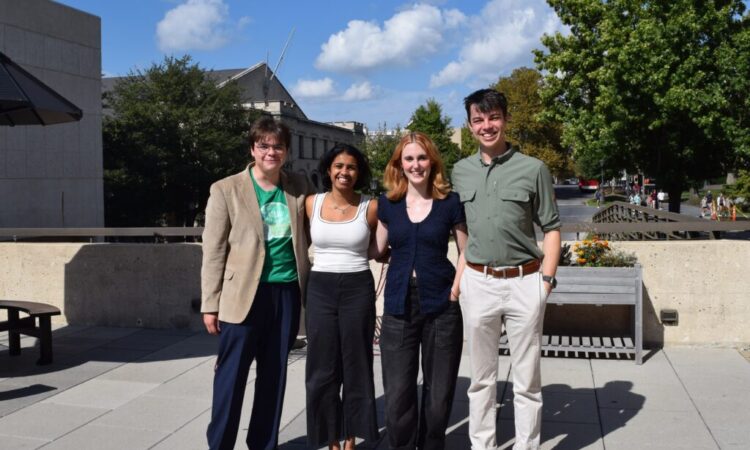University students seek to safeguard Arkansas’ natural resources through ballot initiative

University of Arkansas students Kevin Durden, Muskan Taori, Sydney Stewart and Wyatt Rice are working to place on the 2026 ballot a constitutional amendment to protect the Natural State’s environment. (Photo by Antoinette Grajeda/Arkansas Advocate)
Inspired by peers in Montana, four University of Arkansas students are working to protect the Natural State’s environment through a proposed constitutional amendment.
The Amendment to Keep Arkansas Natural would preserve the state’s outdoors and natural resources for recreation, economy and public health, and give Arkansans “the fundamental right to a clean and healthy environment.”
The proposed ballot measure would require the Legislature to enact laws to “protect wildlife and natural resources from unreasonable misuse,” and allow Arkansans to sue the state for violating the measure.
Kevin Durden, a UA sophomore and one of the drafters of the measure, said he and UA juniors Wyatt Rice, Sydney Stewart and Muskan Taori, are taking action because time is running out to address the climate crisis.
LISTEN:
Hear three University of Arkansas students explain, in their own words, why they’re proposing a constitutional amendment to protect the state’s environment.
https://arkansasadvocate.com/wp-content/uploads/2025/10/20251020_UABallot.mp3
“One constitutional amendment in Arkansas isn’t going to fix everything, but it’ll fix part of it, and doing something’s better than nothing,” he said.
Durden decided to investigate what protections existed for Arkansas’ environment earlier this year after reading about sixteen Montana youth who filed a lawsuit in 2020 that challenged fossil-fuel based provisions of state laws. The plaintiffs, ages 2 to 18, argued the laws contributed to climate change, which violated their right to a clean and healthy environment guaranteed in the state’s constitution.
A judge ruled in favor of the young Montanans in 2023, and the Montana Supreme Court upheld the decision in December. Last month, a judge awarded $3 million in attorney’s fees in the case, and the Montana Attorney General’s Office said it would likely appeal, according to the Daily Montanan.
Several of the Montana plaintiffs joined other young Americans in filing a separate lawsuit in May against the federal government over a series of climate and energy policies.
Though climate discussions can be divisive nationally, Rice said what he appreciates about the text of the amendment, which is inspired by Montana’s constitution, is that it’s not specifically about “climate change.” Arkansans generally interact with their environment through recreation and leisure, important things that aren’t “nearly as controversial as some people like to make climate change out to be,” Rice said.
“That’s something that really works in our favor,” he said. “I don’t know anybody that doesn’t want their kids and their grandkids to have access to the beautiful environment that we have in Arkansas, and so I think that’s really what we’re trying to protect.”
The students, who drafted most of the proposal on their own, are receiving pro bono services from Jennifer Waymack Standerfer, a Bentonville attorney who’s worked on other Arkansas ballot measures.
“It’s cool language, it’s a cool group of kids who came up with it on their own, and I couldn’t say no to helping them,” Standerfer said.
Let us know what you think…
The students have been revising their proposal after Attorney General Tim Griffin rejected their initial submission on Oct. 3. According to an opinion prepared by Assistant Attorney General William Olson, problems with the proposed amendment’s text prevented the attorney general from ensuring the ballot title was not misleading or substituting a more appropriate ballot title. Cited issues included the lack of definition of “environment,” the inclusion of “partisan coloring” language and grammatical errors.
After submitting their first draft, the students had a meeting with the attorney general’s office to learn more about the ballot initiative process and were surprised when Griffin joined for part of it.
“It was a pleasure to meet with this group of students and see their interest in learning about the political process,” Griffin said. “Being civically engaged at all stages of life is a wonderful thing and is something we should all encourage.”
Stewart, who joined the in-person meeting over Zoom, was grateful for the feedback.
“I was just really appreciative that they approached it in a way that we want to see this be as successful as possible,” she said.
Arkansas is one of 24 states that allow citizen-led initiatives such as the students’ proposed amendment, according to the National Conference of State Legislatures. The direct democracy process allows Arkansans to propose constitutional amendments and state laws and put them to a statewide vote.
The process, particularly the petition-gathering phase, will see several changes during the 2026 election cycle due to laws passed during the legislative session this spring. While supporters say the statutes, a number of which are being challenged in court, will protect the integrity of the direct democracy process, opponents have argued it will make it more difficult for Arkansans to propose their own laws.
Durden paused his work on the amendment this spring after realizing “the rules were changing in real time” during the legislative session. When Durden resumed the project this summer, he felt a sense of urgency because he realized the process could face more restrictions in the future.
“I think most people like being the Natural State. I don’t think anyone wants to see that go away, and getting to use that power for us to bring initiatives, especially at a time when we see a lot of laws trying to restrict that, I thought was really cool,” he said.
If the attorney general eventually certifies their proposal’s language, the students must then collect nearly 91,000 signatures from registered voters in at least 50 counties. Durden said he wants to avoid paid canvassers and plans to develop a broad network of volunteers at other colleges and environmentally-related groups to help collect enough signatures to qualify for the ballot.
While “there’s a lot of pessimism in politics” and people often see younger generations as “disengaged” and “disaffected,” Rice is hopeful their work will demonstrate that’s not the case.
“No matter what happens, I think it’s important for people to see that young people do care about what happens in their government and what happens in their future,” he said. “And so I think that’s another reason why we want to build this as a large, broad-based movement of younger people, is to get that out there.”
Stewart said she has “felt very empowered by this process” because it’s something she can do, and she hopes it demonstrates how others can take action too. Durden agreed.
“I have a lot of anxiety about a lot of things, but being able to channel that anxiety into something that is productive and that I care about in this initiative has kind of helped mitigate that,” he said.
The four students are continuing to work with Standerfer to revise their amendment and plan to submit their proposal as soon as possible.
SUBSCRIBE: GET THE MORNING HEADLINES DELIVERED TO YOUR INBOX




